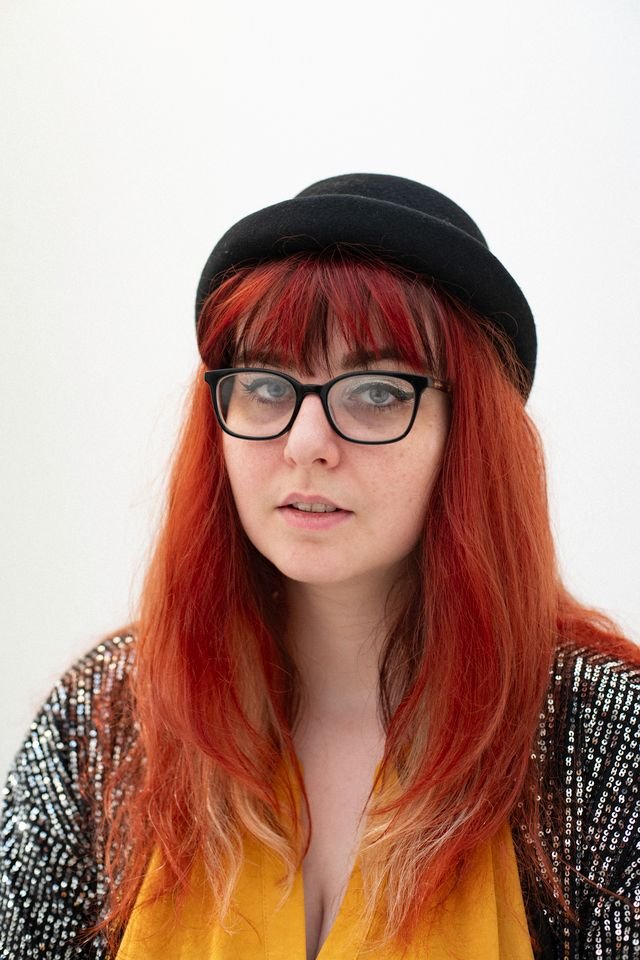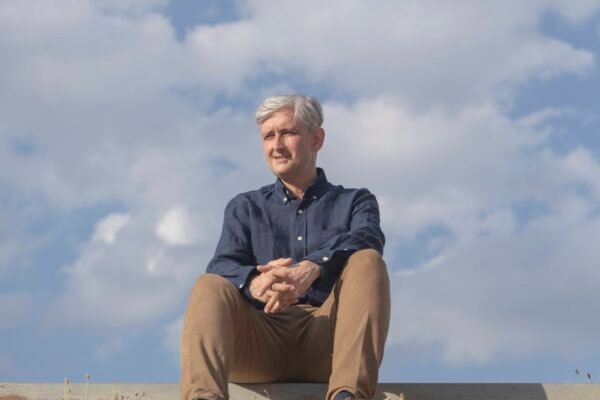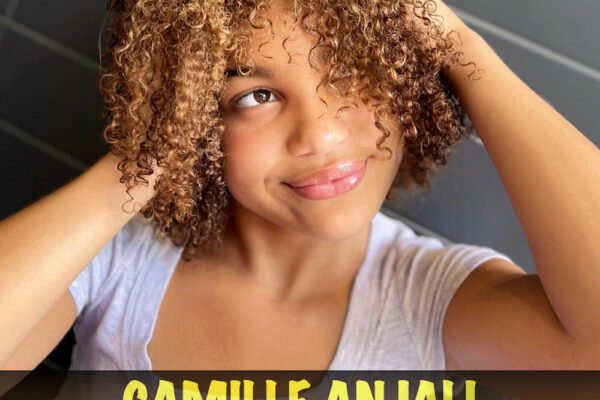Q: Can you tell us a bit about yourself and how your childhood impacted your musical direction?
A: Of course! My name is Lauren Alex Hooper and I’m a neurodivergent, disabled singer- songwriter. I never actually set out to be a singersongwriter: I loved writing (I originally wanted to write novels) and I loved music but I was incredibly shy and couldn’t imagine singing in front of anyone. But I was surrounded by music: my maternal grandmother was a concert pianist; one of my parents is a Jazz musician; two other parents ran a studio for years that I spent quite a bit of time at: I had piano lessons, singing lessons, and sang in multiple choirs. So the groundwork was definitely being laid, even if I didn’t notice it at the time. All of the writing has definitely made me a very lyric-focussed artist but I think that being exposed to such a variety of music has resulted in an approach where I find myself pulling from all kinds of places, unrestrained by genre.
Q: How are you planning on growing your fan base and sharing your music with the world? What message do you have for anyone who is about to discover “Lauren Alex Hooper”?
A: Because I’m physically disabled, gigging can be difficult so playing live isn’t a reliable way to build a community around my music – at least, not right now. I do still go to gigs here and there as I can manage it and make connections that way. But mostly it’s through talking to people online. There are already such big communities that have formed around the common experiences of being neurodivergent, of living with disability, with chronic illness, with mental illness… I’ve been part of those communities for a long time and now I get to share this music that hopefully will resonate because many of us have these common experiences. I’ve just started to hear from people who have listened to this song and to hear that they have felt understood, have felt seen, by it means so much to me. Once my music is out in the world, that’s the most important thing to me: that the person hearing it feels less alone for hearing it. So I guess that’s the message of me, of my music: it’s all about connection, about feeling less alone, and about feeling seen and understood.
Q: Who is the most inspiring artist for you right now? And where do you find inspiration for making music?
A: I have Halsey’s newest album, The Great Impersonator, on repeat: I relate to a lot of it on a very personal level but I also love how every track sounds so different, from a piano demo to arena-ready anthems. I also just saw Gracie Abrams live and she was incredible so I’ve gone back to the beginning of her discography and am listening to it all again with fresh ears.
Q: Can you tell us about the story or message behind the song, “Write This Out”?
A: When I was writing ‘Write This Out,’ it was very much about my struggles with OCD. Because it manifests as memory hoarding, I have to record and write down everything (although I have been able to reduce the level of detail over the years with the help of therapy, which I’m very grateful for). So I was trying to write about that, to express the panic of what might happen if I didn’t write down every moment. What if it turned out to be important and informed who I was? What if I forgot it? Who would I be if I forgot the most important parts of myself? But then, when I went back to it, to redraft and refine it, I felt like it connected to this bigger story of being autistic. As an autistic person, I often struggle to regulate my emotions and trying to hold on to everything is just completely overwhelming and makes it impossible to function; I had to get some of those thoughts and feelings and experiences out of me, write them out of me, because you just can’t carry everything that happens to you. It’s not possible and, even if it was, it’s not healthy. You have to let certain things go, even if you are writing them down and tucking them away for safekeeping.
Q: How would you describe your sound in one word for potential listeners?
A: Wilful.
Q: Did you face any challenges while writing or recording “Write This Out”?
A: ‘Write This Out’ was actually a pretty easy song to both write and record. I’d been thinking about it for a long time when I finally wrote it and I had a really clear vision for the production. That’s generally the exception rather than the rule though. For example, I have a song coming out soon where I really struggled with the production because I didn’t have that clear vision when I started and that made it really hard to get a sense of what the right sound was and therefore how to produce it.
Q: What is the message of your music? And what are your goals as an artist?
A: I think the message of my music is about connecting and feeling seen and understood; however you’re feeling is valid and there will be someone out there who feels the same way you do. That’s why I tend to talk more about a community rather than a fanbase. I don’t want to be the voice of Autism because no one person can be and while these songs are about me and my experiences, I hope they don’t stay that way forever: I hope that they resonate with other people and encourage them to be open about what they feel and what they need; I hope they inspire a little more understanding and compassion in people who don’t have previous experience of being autistic. It would forever be my greatest achievement if these little songs that I wrote in my bedroom or my best friend’s living room could, even in the tiniest of ways, help to improve how the autistic community is treated. But that is a very, very big goal! Fortunately I do have smaller, more realistic and achievable goals: as I said, I hope to build a community around my music; I hope to perform more and even tour if I could find an accessible way of doing it; I want to work with Autism focussed charity to increase awareness and understanding and resources for autistic individuals; I want to work with more neurodivergent people within the music industry; I want to continue to build on this project because being autistic – and how I feel about it – isn’t static and so I will always have more to say.
Q: Who is your dream artist to collaborate with? (dead or alive)
A: Wow, this is such a hard question! Songwriting-wise, I would love to write with Amy Allen, who has some amazing songs – most recognisably in pop – and has written with some of my favourite and most listened to artists, including Halsey, P!nk, Olivia Rodrigo, Kelly Clarkson, and Maisie Peters. She just won Songwriter of the Year at The Grammys. I particularly love what she does with melody and, given the less than conventional subject matter of my songs, I’d love to see how we could bring those two things together. But if we were talking producers, I’d love to work with Jack Antonoff. I love the anthemic and yet somehow nostalgic sound he makes with Bleachers. He’s talked about how he found a specific sound on his Juno-106 and how that went on to be the foundation of the ‘Bleachers sound’ because that sound created a physical feeling of hope within him. The way he talks about production has always resonated with me and I’d love to work with someone who’s on the same wavelength as me like that. I also love how he’s experimented in other genres and artists and, especially when working on a full album, he’s able to create a signature sound specific to that album that still fits within the artist’s sound.
Q: What is your advice for people interested in pursuing music as a career or for those trying to enter the industry?
A: I think I can only speak to those wanting to be singersongwriters because that’s where my experience lies in an industry that is so vast and so full of different roles and routes to get there. On this, my advice would be to write about what you’re passionate about, rather than what you think people want to hear; it will always resonate more powerfully with your listener. I would suggest you learn as much as you can about production so that, even if you don’t end up producing yourself, you can communicate clearly and easily with a producer. I would encourage you to never stop experimenting because you never know where you’ll find that next great idea. And I know that some people encourage practical experience over going to a music school – personally I think there’s no wrong way – but I gained so much from studying songwriting, not just in terms of musical skills but also about networking and building a community around me: I have such an amazing circle of creatives around me and I don’t know if I would’ve found that had I not been able to practice in a safe space like my university.
Q: If you could go back in time and give a younger you some words of wisdom, what would they be?
A: If I could go back to when I first got serious about songwriting, I would sit my younger self down and tell her to stop sanding down the edges of her songs to make them more palatable, to make them more relatable. I would tell her to write her truth, rather than what she thinks people want to hear. One of the reasons I started writing songs was because I wasn’t hearing anything that resonated with me but then, scared of being so vulnerable and scared of people not liking my songs, I toned myself down and it took a long time to unlearn that lesson. I’d tell her that the songs may not be what everyone wants to hear but you will find your audience; there are other people out there just like you, who need to hear the songs that you need to write.
Listening to songs so you don’t have to! Just kidding :D, you totally should. Music blogger by day, nurse by night





